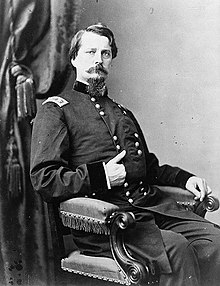While Sheridan was
out on raiding the Virginia Central Railroad, and trying to attract
the attention of Robert E. Lee. Grant and Meade began to put their
plan to attack Petersburg into action. The movement began on the
night of June 12, and work began on an over 2000 foot pontoon bridge
across the James River. The Union army began crossing on June 14, and
all the men were not across until the 18th. However, they
did not wait that long to strike at Petersburg. The advance on that
town began on June 15. Leading the Federal army was Benjamin Butler's
Army of the James, which had already failed to capture Petersburg
once during the Bermuda Hundred Campaign.
Petersburg was
very weakly held. Lee had not realized that Grant was attacking
Petersburg with his entire army, and so remained north of the James.
The commander at Petersburg was P. G. T. Beauregard. He still had to
deal with Butler on the Bermuda Hundred, so he only had 2,200 men to
hold the Petersburg defenses.
 |
| Smith |
As “Baldy”
Smith, commander of the XVIII corps, approached Petersburg on June
15th, 150 years ago today, he was worried about the
strength of its entrenchments. There were six foot high breastworks
surrounded by a ditch six feet deep and fifteen wide. In front of
this obstacle was a row of felled trees with branches sharpened to
delay the attackers while they were shot at from the walls. Smith
spent time examining the positions, and looking for weak spots. By 4
pm he had decided to attack with heavy skirmish lines, hoping that
they would not suffer heavily from Confederate fire during the
charge. He set the launch off time at 5 pm, but it was discovered
that no one had told the artillery chief of the plans. The guns were
needed for supporting fire while the infantry attacked. The artillery
horses had been sent away for water, and could not pull the guns into
position. Smith delayed the attack until 7 pm, when his troops were
able to move forward.
When Smith's men
charged these works, they found them much less formidable than they
had imagined. As they pushed backed the skirmishers, crossed the
abatis and climbed the ditch, they quickly gained the walls meeting
little resistance. Many batteries were captured by Smith's advance
over more than a mile of entrenchments. At this point, however, Smith
halted the assault. The Confederates fell back to a weaker line, and
Smith thought it likely that Lee had crossed the James and was in his
front. He wanted to prepare his men to meet a counter-attack, not
continue forward. Winfield Scott Hancock arrived, ahead of his corps,
and although the senior officer on the field and normally aggressive,
he acquiesced to Smith's decision. No more attacks would be made that
night.
 |
| Hancock |





0 comments:
Post a Comment